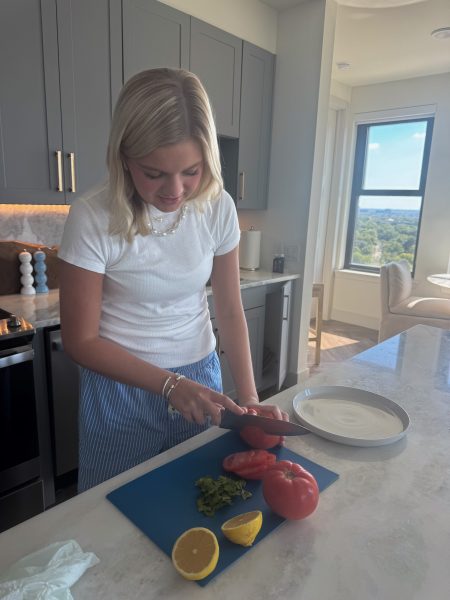Leaving behind home-cooked meals and, for most college freshmen, transportation, means relying on dining hall mystery meat, begging friends for grocery store runs, and making do with a miniature fridge to store any leftovers from eating out.
“I don’t have my car so I have been to the grocery store once since being here,” said Brooke Lewis, a freshman at SMU.
To maintain a balanced diet in college is a real test of perseverance. According to the National Library of Medicine, substantial life-changing transitions happen when young adults finish high school to start college or their professional life. When students’ main food sources are in the dining halls that are stocked with meals higher in carbohydrates and fats, it can be hard to want to dodge the pasta bar.

“The dining hall has a lot of pizza, sandwiches and Asian food but the only veggies I get is if I make my own salad at the salad bar,” Lewis said.
SMU’s hospitality hot spot, Sushic, was getting old for Lewis and DoorDash grocery delivery was her next option.
“I have DoorDashed twice but then you get 15 missed calls and they never pick out exactly what you want and you don’t actually get to see it.”
While it hasn’t been a walk in the park for Lewis, Emmy Kay Jensen, a junior, knows there’s a light at the end of the tunnel. She is in her first apartment and quickly finding her way back to a balanced and healthy lifestyle.
“Having a kitchen after two years of being in a dorm changes everything,” Jensen said.
Jensen grew up dancing, which often meant trading meals for protein bars since that was all the time her schedule allowed. She also had most of her meals prepared for her
But Jensen’s passion for cooking healthy meals has taken off.
“I try to not get anything premade and I have a board that I have saved of TikTok recipes,” Jensen said. “ I am picky so I take what I see in the recipe and then find alternatives.”
The idea of eating healthy is appealing, but sometimes students need to stick to a budget or avoid wasting groceries. Jensen said she has a mindful approach to using ingredients.
“What I have been doing is getting ingredients, bringing them home and laying them out,” she said. “Then I actually use ChatGPT to help create recipe ideas with what I have.”
Jensen said she feels “brand new” after changing from her dorm to apartment.
“When I was in a dorm I felt like I would wait until I was starving and then would grab a bag of crackers, or something without nutrients,” she said. “I would rarely go to the dining hall and then, not having a kitchen made me so much more inclined to snack on random things.”
Having lived in both a dorm and apartment, Nathan Alvarez, a senior studying finance, said that his experience with meals has clearly shifted, especially because now he is a commuter student living back home with his parents.
“Freshman year was definitely the hardest in terms of finding healthy options just because you are relying on the dining hall which is not the best,” Alvarez said. “You have to really want to seek out healthy foods to access them.”
After surviving dorm life, some might use the apartment kitchen to meal prep to maintain healthy eating habits, like Jensen. But, that was also an issue, Alvarez said.
“Maybe it’s just a me thing, but I feel like meat after a few days is kind of strange, so I don’t eat on the go and I prepare my meals in real time.”
The adjustment from high school to college or even college to a first apartment poses struggles when figuring out how to eat healthy. So, how can students make a meal plan in a dorm when food delivery is so convenient?
Madison Troyer, SMU’s registered sports dietician, shared the importance of resorting to more creativity.
“I remember I used to make avocado toast in the dining hall and people would be like, ‘Where’d you get that?’” Troyer said. “I would be like, ‘There are avocados at the omelet station, boiled eggs at the salad bar and there is toast at the pantry station.’”
Not only does she suggest looking beyond the surface of what your food sources have to offer, but Troyer believes in having a plan.
“You don’t have to eat the same things everyday, but I do think that having that consistency and knowing the time you are going to be able to eat, what you’ll eat and where you are going to get it from truly sets you up for success.”





















